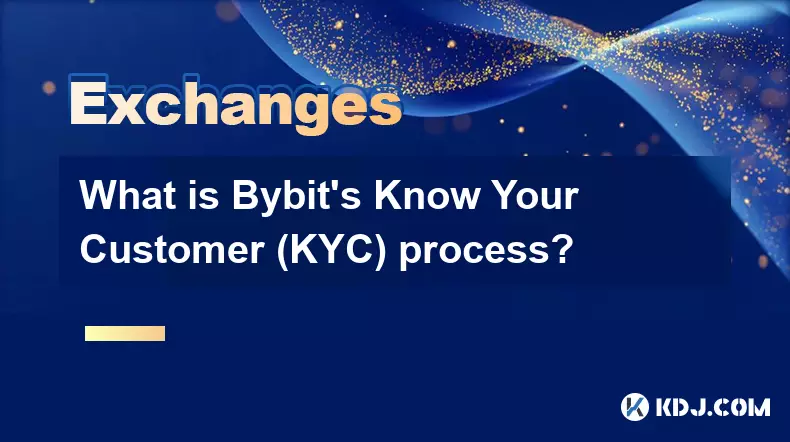-
 bitcoin
bitcoin $114779.865156 USD
2.30% -
 ethereum
ethereum $4226.519789 USD
2.39% -
 tether
tether $1.000545 USD
0.04% -
 xrp
xrp $2.890223 USD
0.92% -
 bnb
bnb $1030.029301 USD
2.95% -
 solana
solana $212.824944 USD
1.69% -
 usd-coin
usd-coin $0.999757 USD
0.01% -
 dogecoin
dogecoin $0.234961 USD
-0.27% -
 tron
tron $0.337174 USD
0.42% -
 cardano
cardano $0.804783 USD
0.09% -
 hyperliquid
hyperliquid $45.748770 USD
-2.85% -
 chainlink
chainlink $21.699170 USD
0.82% -
 ethena-usde
ethena-usde $1.001452 USD
0.08% -
 avalanche
avalanche $30.237800 USD
1.14% -
 stellar
stellar $0.372604 USD
1.52%
What is Bybit's Know Your Customer (KYC) process?
Bybit’s tiered KYC system enhances security and compliance, requiring ID verification, real-time geolocation checks, and third-party validation to unlock trading features and withdrawal limits.
Sep 27, 2025 at 01:18 am

Understanding Bybit's KYC Verification System
1. Bybit implements a tiered Know Your Customer (KYC) system designed to comply with international regulatory standards while ensuring user security. Users are required to submit government-issued identification documents such as passports, national ID cards, or driver’s licenses. The verification process checks the authenticity of these documents through automated scanning and artificial intelligence technologies that detect alterations or fraudulent submissions.
2. During registration, users select their country of residence, which determines the specific KYC requirements they must meet. Certain jurisdictions have stricter compliance protocols due to anti-money laundering (AML) regulations. Bybit integrates real-time geolocation checks to verify the declared country matches the user’s actual location, reducing the risk of identity fraud.
3. The platform uses third-party data validation services to cross-reference submitted information with official databases. This includes checking names against global sanctions lists and politically exposed persons (PEP) registries. Any discrepancies trigger manual review by Bybit’s compliance team, which may request additional documentation or clarification from the user.
4. Verified users gain access to higher withdrawal limits, advanced trading features, and participation in token sales or staking programs. Unverified accounts face restrictions on fund movements and trading capabilities, incentivizing timely completion of KYC procedures. The entire process typically takes under 24 hours, though complex cases may require extended review periods.
User Data Security and Privacy Measures
1. Bybit encrypts all personal data using AES-256 encryption during transmission and storage. Sensitive documents like ID scans are stored in isolated servers with multi-factor authentication access controls. Regular penetration testing ensures vulnerabilities are promptly addressed by the cybersecurity team.
2. The exchange adheres to GDPR and other regional privacy frameworks, allowing users to request data deletion or access logs of their information usage. Third-party service providers handling KYC data must sign strict confidentiality agreements and undergo annual security audits.
3. Biometric data is not collected during verification. Facial recognition technology used for liveness detection processes images locally on the user’s device without storing facial templates. This minimizes exposure risks while confirming the person presenting the ID is physically present.
4. Two-factor authentication (2FA) is mandatory for all verified accounts. Users receive immediate email and SMS alerts for any changes to account settings or login attempts from unrecognized devices, enhancing protection against unauthorized access post-KYC approval.
Impact of KYC on Trading Privileges
1. Tier 1 verification enables basic spot trading with daily withdrawal caps of 2 BTC. To unlock futures trading, margin services, and higher limits, users must complete Tier 2 verification involving proof of address documents like utility bills or bank statements issued within the last three months.
2. Institutional clients undergo enhanced due diligence (EDD), requiring corporate registration papers, beneficial ownership disclosures, and source of funds documentation. These accounts receive dedicated support but face more rigorous monitoring for suspicious activity patterns.
3. Geopolitical factors influence KYC enforcement; users from high-risk jurisdictions may experience longer processing times or additional screening layers based on FATF guidelines. Bybit periodically re-verifies existing users to maintain compliance as regulations evolve.
4. Failed verification attempts due to expired IDs or mismatched details result in temporary account freezes. Support tickets can be filed to resolve issues, but repeated violations may lead to permanent restrictions. Clear instructions and error explanations are provided at each step to minimize user confusion.
Frequently Asked Questions
What document types are accepted for Bybit KYC?Bybit accepts passports, government-issued national ID cards, and driver’s licenses. Documents must be valid, unexpired, and clearly show the user’s full name, photo, date of birth, and issuance authority. Scans should include both front and back sides if applicable.
Can I change my verified name on Bybit?Name changes after verification are not permitted unless accompanied by legal documentation such as a marriage certificate or court order. Users must contact customer support with certified copies of relevant documents to initiate review.
Why was my KYC rejected despite submitting correct documents?Common reasons include blurry images, glare on ID surfaces, cropped edges obscuring information, or mismatched details between the registration form and official documents. Ensure all text is legible and matches exactly what was entered during signup.
Does Bybit share my KYC data with external parties?Bybit does not sell or freely distribute user data. Information is shared only with authorized regulatory bodies when legally required, or with vetted partners essential for compliance operations like identity verification providers under strict data processing agreements.
Disclaimer:info@kdj.com
The information provided is not trading advice. kdj.com does not assume any responsibility for any investments made based on the information provided in this article. Cryptocurrencies are highly volatile and it is highly recommended that you invest with caution after thorough research!
If you believe that the content used on this website infringes your copyright, please contact us immediately (info@kdj.com) and we will delete it promptly.
- BlockDAG, DOGE, HYPE Sponsorship: Crypto Trends Shaping 2025
- 2025-10-01 00:25:13
- Deutsche Börse and Circle: A StableCoin Adoption Powerhouse in Europe
- 2025-10-01 00:25:13
- BlockDAG's Presale Buzz: Is It the Crypto to Watch in October 2025?
- 2025-10-01 00:30:13
- Bitcoin, Crypto, and IQ: When Genius Meets Digital Gold?
- 2025-10-01 00:30:13
- Stablecoins, American Innovation, and Wallet Tokens: The Next Frontier
- 2025-10-01 00:35:12
- NBU, Coins, and Crypto in Ukraine: A New Yorker's Take
- 2025-10-01 00:45:14
Related knowledge

How to find the contract address for a token on KuCoin?
Sep 30,2025 at 09:00pm
Finding the Contract Address on KuCoin1. Log into your KuCoin account through the official website or mobile application. Navigate to the 'Markets' se...

How to unbind my phone number from my KuCoin account?
Oct 01,2025 at 05:00am
Understanding the Importance of Phone Number Security on KuCoin1. Maintaining control over your KuCoin account involves managing all associated contac...

How to export my KuCoin trading history for taxes?
Oct 01,2025 at 05:18am
Accessing Your KuCoin Account for Data Export1. Log in to your KuCoin account using your registered email and password. Two-factor authentication must...

How to lend my crypto on KuCoin?
Oct 01,2025 at 03:01am
Getting Started with Crypto Lending on KuCoin1. Access your KuCoin account through the official website or mobile application. Ensure that two-factor ...

How to check my portfolio balance on the KuCoin app?
Oct 01,2025 at 07:55am
Accessing Your Portfolio Overview1. Launch the KuCoin app on your mobile device and log in using your registered credentials. Ensure that two-factor a...

How to trade on the KuCoin spot market?
Sep 30,2025 at 11:36pm
Understanding the KuCoin Spot Market Interface1. After logging into your KuCoin account, navigate to the 'Markets' section and select 'Spot Trading.' ...

How to find the contract address for a token on KuCoin?
Sep 30,2025 at 09:00pm
Finding the Contract Address on KuCoin1. Log into your KuCoin account through the official website or mobile application. Navigate to the 'Markets' se...

How to unbind my phone number from my KuCoin account?
Oct 01,2025 at 05:00am
Understanding the Importance of Phone Number Security on KuCoin1. Maintaining control over your KuCoin account involves managing all associated contac...

How to export my KuCoin trading history for taxes?
Oct 01,2025 at 05:18am
Accessing Your KuCoin Account for Data Export1. Log in to your KuCoin account using your registered email and password. Two-factor authentication must...

How to lend my crypto on KuCoin?
Oct 01,2025 at 03:01am
Getting Started with Crypto Lending on KuCoin1. Access your KuCoin account through the official website or mobile application. Ensure that two-factor ...

How to check my portfolio balance on the KuCoin app?
Oct 01,2025 at 07:55am
Accessing Your Portfolio Overview1. Launch the KuCoin app on your mobile device and log in using your registered credentials. Ensure that two-factor a...

How to trade on the KuCoin spot market?
Sep 30,2025 at 11:36pm
Understanding the KuCoin Spot Market Interface1. After logging into your KuCoin account, navigate to the 'Markets' section and select 'Spot Trading.' ...
See all articles










































































